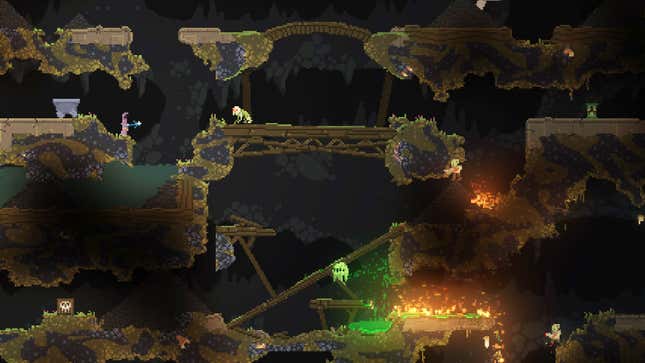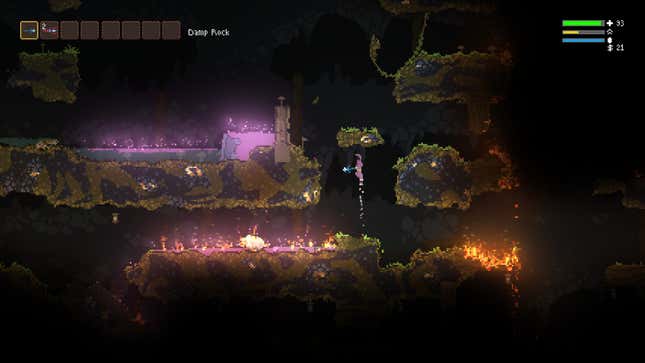
Noita, out today via Early Access on Steam, comes from some of the creators of the excellent indie games The Swapper and Baba is You. Both are puzzle games focusing on taking rules to their extremes, using the lenses of body-swapping and computer programming, respectively. Noita does the same, but without the puzzle aspect. Everything in its world has physical properties, and what you do to things has both immediate and far-reaching consequences on your journey through the game’s caves.
You play as a wizard (“noita” is the Finnish word for “witch”) making a perilous downward journey through areas full of monsters. There’s platforming, though your character’s ability to hover makes it less of a focus than in similar roguelikes like Spelunky or Caveblazers. You start with a wand that shoots some basic projectiles and another that fires three bombs, which refill between levels. You can find new wands as you explore, or buy them at the shop between areas. The wands’ powers can be mixed and matched: You can swap out a projectile for a fireball, or add an ability that leaves acid trails. In the shop, you also choose between random powerups such as more health, the ability to freeze liquids, or immunity to fire or explosions.
Noita’s developers describe the game as “a world where every pixel is physically simulated.” Coal can be lit on fire. Dirt can be dug through or destroyed. Liquids like acid, water, and blood pool and overflow, and they also stay on you until you wash them off. Oil makes you slippery and flammable, and acid eats away at your health. Water makes you immune to fire and also washes away other effects.
All of this leads to a lot of chaos, as your actions have consistent but often unpredictable consequences. Flammable things light on fire, and the fire spreads. Killing an acid-spewing monster above you dumps acid on you, sending you searching for some water to jump into while your health ticks down. I’ve thrown a bomb too close to a coal deposit, causing a chain reaction of explosions that have destroyed huge swathes of a level. I’ve thrown a bottle of a transmogrifying potion only to get turned into a sheep when I landed in a puddle of it that had dripped into the corridor below.

In many games, “destructible environments” means that a certain number of blocks explode, or that punching a wall leads to a scripted hole. In Noita, every pixel bears the consequences of your actions, leading to clouds of flammable gas or showers of dirt that can quickly get out of hand. My attention often swerved from surviving enemies to surviving my own mayhem. It can be a bit overwhelming, but it’s also a lot of fun.
Noita is a tough game, especially given the environmental hazards all around you. Enemies can appear in overwhelming numbers, and a few times I got stuck on single pixels when trying to escape them. The game currently controls best with mouse and keyboard. Trying to use a controller to aim is imprecise. The developers say “a functional final boss and ending exists” in the game, but after six hours, I don’t think I’m anywhere near it. The developers predict that Noita will spend a year in early access, during which time it will be polished and perhaps get more enemies and items.
During one run, I “angered the gods” and got killed in the middle of a fight between a giant worm and a floating skeleton, who I assume were somehow akin to Spelunky’s time-keeping ghost. It was a disappointing moment—I was in the shop in the midst of a good run when the fight crossed my screen. But it was also amazing: I have no idea what happened or when, whether I did something to anger said gods or if it was a fire-shooting enemy attacking a foe someplace that set things off.
Noita is full of these moments that feel random but aren’t: Something logical caused them, even if that logic can be too much for the player to comprehend.